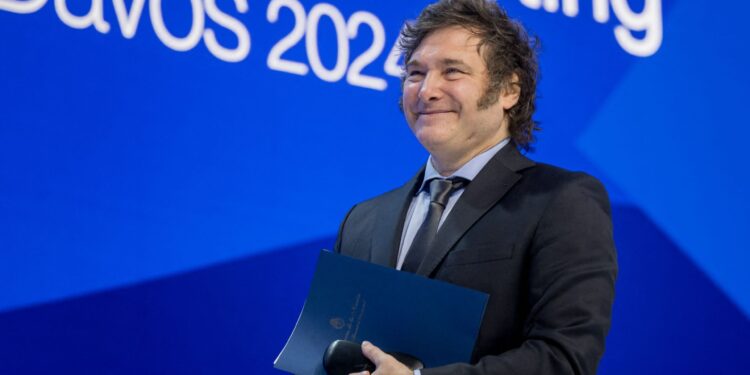The comprehensive reform package approved by Argentine President-elect Javier Mele crossed the first parliamentary hurdle, as it received general approval on the third day of debate in the House of Representatives, while the initiative, which included economic, social and political fields, sparked strong protests from the opposition and the Argentine street.
Argentina has been living in a long-standing conflict with violent economic crises, which have prompted its citizens to turn their attention to Milli, who achieved a resounding victory in the elections last October. As a result of public discontent over decades of economic instability, with annual inflation exceeding 200% and poverty levels rising to 40%, Milley embarked on a “bold path to redefine Argentina’s future,” as he described it.
Massive opposition
Tens of thousands took to the streets in defiance of Milley’s austerity measures, which included balance sheet cuts. The demonstrations disrupted parliamentary debates, leading to confrontations between law enforcement forces and protesters. Police fired rubber bullets and tear gas, and sprayed demonstrators with water cannons, with reports of injuries and arrests among demonstrators.
Meanwhile, the leftist opposition withdrew from Parliament, denouncing what it considered severe police repression of the demonstrators.
“We cannot work this way,” opposition lawmaker Mariano del Caño told the Associated Press, stressing that the protesters should be heard before they return again to the session after a period of suspension.
Parliamentary maneuvers
In a strategic move to strengthen his program, Milley obtained approval from the International Monetary Fund to disburse approximately $4.7 billion to Argentina.
The reform package, dubbed Omnibus, extends across various sectors, from electoral and cultural reforms to privatization, amendments to the penal code, and changes to the status of football clubs. The House of Representatives, by a vote of 144 to 109, granted general approval, paving the way for the next phase of negotiations in the Senate. The bill’s 664 provisions, which outline the complex fabric of Milley’s reforms, will be subject to careful scrutiny and possible amendments.
Although the House of Representatives generally approved Milley’s reform bill, negotiations loom on the horizon. The complex details of the draft law, which include economic, administrative, criminal and environmental areas, will be subject to strict scrutiny according to a parliamentary description supporting the plan.
Lawmakers, some of whom have expressed reservations about specific articles related to the privatization of state companies and delegation of legislative powers to the president, are scheduled to participate in detailed discussions. Milley’s challenge is not only to overcome ideological differences, but to build consensus within a fragmented political landscape. The upcoming recess will provide a breather before crucial negotiations resume, marking a pivotal stage in Milley’s ambitious agenda.
Milley’s presidency is at a crossroads
Milley’s presidency, marked by libertarian principles and capitalist ideals, faces the complex challenge of balancing economic liberalization with societal expectations. Austerity measures and privatization plans were not without opposition, leading to protests and even a general strike. The president’s rapid actions, including a 50% devaluation of the peso, cutting subsidies, and dramatically downsizing ministries, reflect his confrontational approach to addressing the government’s budget deficit and combating inflation.
However, these measures sparked discontent, with protesters questioning the potential impact on the most vulnerable groups in society.
The path of Milley’s reforms will shape the country’s economic and social landscape. Experts believe that the delicate process between government initiatives, parliamentary negotiations, and street reactions highlights the multifaceted nature of the current socio-political reality in Argentina.
As Argentina grapples with historic economic challenges, observers expect Milley’s presidency to mark a decisive chapter, and the dichotomy between economic liberalization and social welfare takes center stage with every decision reverberating in the corridors of power and crowded streets.



